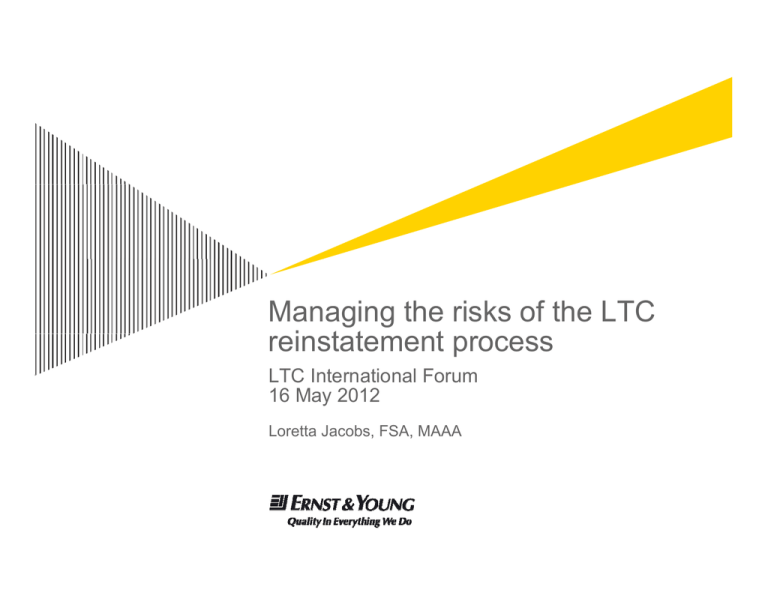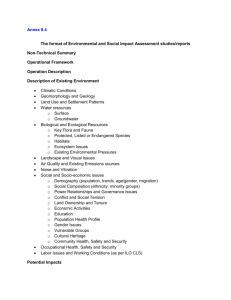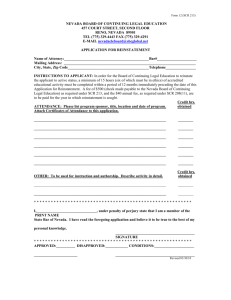
Managing the risks of the LTC
reinstatement
i t t
t process
LTC International Forum
16 May 2012
Loretta Jacobs, FSA, MAAA
Agenda
►
Reasons for reinstatement requests
►
Regulatory lapse and reinstatement protections
►
►
►
NAIC LTC Model Regulation
►
Washington state and Florida regulations
Reinstatement disputes
►
Five-month time period
►
D
Demonstration
t ti off cognitive
iti or ffunctional
ti
l iimpairment
i
t
►
Continuous confinement
►
Premium billing and collection processing
Reinstatement risk management – what insurers can do to limit
exposure
HY_])
DL;j]afklYl]e ]fljakc
Reasons for reinstatement requests
►
Policy has unintentionally lapsed because insured is either cognitively
or functionally impaired at time of premium billing and is not
reasonably capable of paying the bill.
►
Policy has unintentionally lapsed for other reasons:
►
►
I
Insured
d did nott receive
i bill.
bill
►
Third party did not receive lapse warning notice.
►
Insurer did not receive the premium that the insured remitted.
►
Insurer made an error in billing or collection.
►
Premiums arrive after end of grace period.
Policyholder
P
li h ld may h
have iintentionally
t ti
ll llapsed
d coverage, b
butt h
has change
h
of heart and requests reinstatement.
HY_]*
DL;j]afklYl]e ]fljakc
Regulatory lapse and reinstatement protections
— NAIC LTC Model Regulation
►
Initial billing notice
►
30-day
30
day overdue billing notice to insured + at least one previously
named third party
►
Termination no earlier than 35 days after overdue notice(s) is(are)
mailed
il d
►
Policyholder will be reinstated if:
►
Reinstatement is requested within five months of termination
►
Can demonstrate cognitive or functional impairment (standard of
evaluation no stronger than policy benefit eligibility) existed on the
termination date
►
Pays all overdue premiums
HY_]+
DL;j]afklYl]e ]fljakc
Regulatory lapse and reinstatement protections
— Washington state language
►
No individual LTC policy or certificate shall lapse or be terminated for nonpayment
of premium unless the issuer has given notice to the insured and those
designated … at least 30 days before the effective date of the termination.
Notice must be given by first class US mail and may not be given until the
premium is at least 30 days overdue. Notice is deemed to be given five days after
mailing.
g
►
A LTC insurance policy or certificate must include a provision for reinstatement of
coverage in the event of lapse, if the issuer is provided proof that the policyholder
or certificate holder was cognitively impaired or had a loss of functional capacity
b f
before
the
h grace period
i d expired.
i d
►
Reinstatement must be available to the insured if requested within five months
after lapse and may allow for the collection of past due premium, if appropriate.
The standard of proof of cognitive impairment or loss of functional capacity must
not be more stringent than the benefit eligibility criteria for cognitive impairment or
the loss of functional capacity contained in the policy or certificate.
►
http://apps.leg.wa.gov/wac/default.aspx?cite=284-83-025
p pp
g
g
p
HY_],
DL;j]afklYl]e ]fljakc
Regulatory lapse and reinstatement protections
— Florida state language
►
If a policy is canceled due to non-payment of premium, the policyholder is entitled
to have the policy reinstated if, within a period of not less than five months
after the date of cancellation, the policyholder or any secondary addressee
designated … demonstrates that the failure to pay the premium when due was
unintentional and due to the policyholder’s cognitive impairment, loss of functional
capacity
p
y or continuous confinement in a hospital,
p , skilled nursing
g facility,
y, or
assisted living facility for a period in excess of 60 days.
►
Notice of possible lapse in coverage due to nonpayment of premium shall be
given by United States Postal Service proof of mailing or certified or
registered
i
d mail
il to the
h policyholder
li h ld and
d secondary
d
designee
d i
at the
h address
dd
shown in the policy or the last known address provided to the insurer. Notice may
not be given until 30 days after a premium is due and unpaid. Notice shall be
deemed to have been given as of five days after the date of mailing.
►
http://www.leg.state.fl.us/statutes/index.cfm?App_mode=Display_Statute&Search
_String=&URL=0600-0699/0627/Sections/0627.94073.html
HY_]-
DL;j]afklYl]e ]fljakc
Reinstatement disputes — five-month time period
start date
►
Does the five-month reinstatement period begin on the date the
unpaid premium was originally due or on the date the insurer actually
processed the termination (at least 65 days later)?
►
Washington state suspended an insurer’s license in 2011 for defining the
time period as beginning on the unpaid premium due date.
►
If other states follow Washington state’s lead, insurers must start fivemonth clock on the date termination is actually processed (not less than
65 days
y after the unpaid
p
bill’s due date).
)
►
If termination processing is delayed for some reason, insureds have even
more time to request reinstatement.
HY_].
DL;j]afklYl]e ]fljakc
Reinstatement disputes — demonstration of
cognitive or functional impairment as of lapse date
►
Cognitive and/or functional impairment is established via documented
records, providing proof of formal testing. However, insureds may not
have completed formal testing before the lapse date.
►
►
Therefore, no proof that qualifying impairment existed on termination date
and reinstatement is not required by law.
Insured has a modest cognitive impairment (CI), but the impairment
does not meet the benefit eligibility criteria in the policy.
►
Modest
M
d t CI may actually
t ll h
have contributed
t ib t d tto th
the llapse iin some way, b
butt
insurers are not required to reinstate policy.
►
Insurers are somewhat discouraged from reinstating, since they risk the
insured claiming for LTC benefits immediately upon reinstatement
reinstatement.
Litigation and dangerous precedent may ensue if such a claim is denied.
HY_]/
DL;j]afklYl]e ]fljakc
Reinstatement disputes — Florida’s continuous
confinement language
►
Florida language significantly broadens reinstatement protections.
►
Insureds “continuously
continuously confined”
confined in a hospital
hospital, skilled nursing facility
(SNF) or assisted living facility (ALF) for at least 60 consecutive days
may be reinstated.
►
ALF is
i ab
broad
d tterm applying
l i tto many senior
i liliving
i arrangements.
t
►
In Florida, court rulings have indicated that ALFs qualify for benefits under
home health care only policies.
►
Simply being confined (in particular, to an ALF) is not the same as
qualifying for LTC benefits.
►
It may be very difficult to deny claim filed immediately after reinstatement
of policy on basis of continuous confinement.
HY_]0
DL;j]afklYl]e ]fljakc
Reinstatement disputes — premium billing and
collection processing related
►
►
Most common complaints include:
►
Insured and/or third party did not receive billing notice and/or overdue
premium lapse warning notice(s).
►
Insurer never receives premium insured claims to have remitted.
►
Insurer receives the monies after the end of the grace period.
Difficult situations faced every day:
►
Premiums arrive one or two days
y after the end of the g
grace p
period.
►
Policyholder has not moved and yet claims to have received neither the
original billing notice nor the lapse warning notice.
►
Insured names multiple third
third-party
party designees and all claim not to have
received the designee warnings.
►
Third-party lapse warnings are returned as undeliverable. What is
insurer’s
insurer
s responsibility?
HY_]1
DL;j]afklYl]e ]fljakc
Reinstatement disputes — premium billing and
collection processing related
►
Emerging issue relating to standard health insurance reinstatement
language contained in LTC policies
►
LTC policies have their own specific reinstatement protection, but still
must also include the health insurance language.
►
Example — Florida
Florida’s
s health insurance reinstatement language:
►
“If the renewal premium is not paid before the grace period ends, the
policy will lapse … Later acceptance of the premium by the insurer …
will
ill reinstate
i t t thi
this policy.”
li ”
►
http://www.leg.state.fl.us/Statutes/index.cfm?App_mode=Display_Stat
ute&Search_String=&URL=0600-0699/0627/Sections/0627.609.html
HY_])(
DL;j]afklYl]e ]fljakc
Reinstatement disputes — premium billing and
collection processing related
►
LTC insurers typically use a “lock box” process to collect premiums.
►
The PO box where premiums are remitted is essentially a bank account
account.
►
Insurers accept premiums directly as deposits.
►
If premiums are received on a cancelled policy, insurer refunds via issuing
a new check.
►
Attorneys claim the insurer has “accepted premium” and, therefore, the
policy has been reinstated.
HY_]))
DL;j]afklYl]e ]fljakc
Reinstatement risk management — what insurers
can do to limit exposure
►
Establish management reinstatement review committee
►
Composed of actuarial
actuarial, legal
legal, claims
claims, underwriting
underwriting, compliance and
policyholder administration staff
►
Tasked with developing and implementing reinstatement review protocols
and controls and making decisions on reinstatement requests
►
Should recommend operational changes to limit future reinstatement
exposure
►
Should
Sh
ld consult
lt with
ith iinternal
t
l and
d external
t
l auditors,
dit
SOX and/or
d/ risk
i k
management professionals in developing its protocols
►
Should regularly report on its findings and recommendations
HY_])*
DL;j]afklYl]e ]fljakc
Reinstatement risk management — what insurers
can do to limit exposure
►
Operational changes to consider:
►
Add system functionality to track EXACT dates on which notices are
mailed and policyholders are terminated.
►
Develop comprehensive system back-up capabilities so as not to disrupt
billing and lapse processing
processing.
►
Maintain records of reinstatement requests to detect patterns and take
corrective action., i.e., condition second or third reinstatement due to
alleged non-receipt
non receipt of mail on switch to automatic bank withdrawal.
►
Add bold “Important insurance information – Premium Notice
enclosed” on envelopes to limit possibility of bills/notices being discarded
as “junk
j
mail.”
HY_])+
DL;j]afklYl]e ]fljakc
Reinstatement risk management — what insurers
can do to limit exposure
►
Operational changes to consider:
►
Establish strict protocols on what constitutes a “late”
late premium vs
vs.
premium within “internal grace period.”
►
For Florida, consider mailing lapse warnings by certified or registered mail
for older,
older higher duration insureds and the rest by USPS proof of mailing.
mailing
►
Explore possibility of not automatically “depositing” premium checks until
after determining the funds have been remitted on active policies.
►
Off to
Offer
t reinstate
i t t if customer
t
can prove good
d health
h lth (re-underwrite).
(
d
it )
►
HY_]),
This may be viewed favorably by regulators and other outside parties reviewing
these situations after the fact.
DL;j]afklYl]e ]fljakc
Questions?
Ernst & Young
Assurance | Tax | Transactions | Advisory
About Ernst & Young
Ernst & Young is a global leader in assurance, tax,
transaction and advisory services. Worldwide, our
152,000 people are united by our shared values and an
unwavering commitment to quality. We make a
difference by helping our people, our clients and our
wider communities achieve their potential.
Ernst & Young refers to the global organization of
member firms of Ernst & Young Global Limited, each of
which is a separate legal entity. Ernst & Young Global
Limited, a UK company limited by guarantee, does not
provide services to clients. For more information about
our organization, please visit www.ey.com.
© 2012 EYGM Limited.
All Rights Reserved.
1205-1358608
This publication contains information in summary form and is
therefore intended for general guidance only. It is not intended
to be a substitute for detailed research or the exercise of
professional judgment. Neither EYGM Limited nor any other
member of the global Ernst & Young organization can accept
any responsibility for loss occasioned to any person acting or
refraining from action as a result of any material in this
publication. On any specific matter, reference should be made
to the appropriate advisor.



